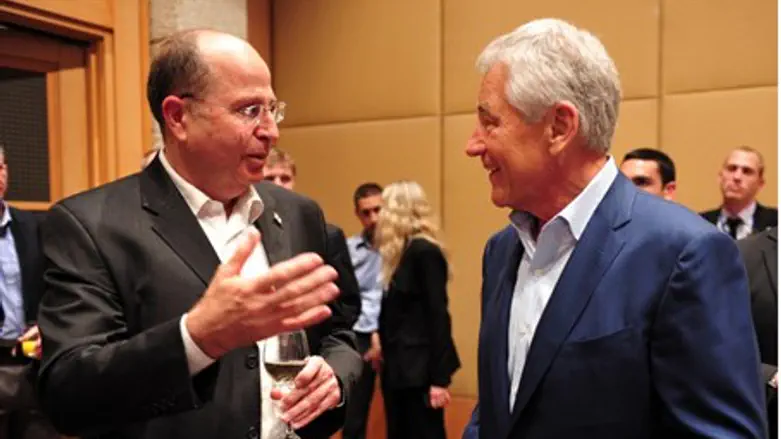
U.S. Defense Secretary Chuck Hagel and his Israeli counterpart, Defense Minister Moshe Yaalon, on Monday hailed a major arms deal as a sign of "ironclad" U.S. support for the Jewish state after talks on Iran's nuclear drive and Syria's war.
Speaking at a joint news conference with Yaalon in Tel Aviv, Hagel confirmed the two had agreed on a multi-billion dollar weapons deal that will see Israel receiving an impressive array of advanced U.S. missiles and aircraft.
"Today we took another significant step in the U.S.-Israel defense relationship," Hagel said, according to AFP. He reiterated Washington's "ironclad pledge" to ensure Israel's military edge in a region rocked by turmoil.
"Minister Yaalon and I agreed that the United States will make available to Israel a set of advanced new military capabilities," including anti-radiation missiles, radars for fighter jets, KC-135 refuelling aircraft, and the V-22 Osprey, which the United States has not released to other countries, he added.
Yaalon admitted Israel had already "acted" to stop advanced weapons from falling into terrorist hands, in what was seen as implicit confirmation of Israeli involvement in a strike on an arms convoy inside Syria in January.
He said Israel had laid down three "very clear red lines" for the regime of Syrian President Bashar al-Assad, the first of which was "not to allow sophisticated weapons to be delivered or be taken by... Hizbullah or other rogue elements."
"When they crossed this red line, we acted," said Yaalon, in what was widely understood to be the January 30 strike which hit what a U.S. official said were surface-to-air missiles near Damascus that Israel suspected were en route to Lebanese Shiite group Hezbollah.
The second red line was maintaining security along the Israeli-Syrian ceasefire line on the Golan Heights, and the third was the transfer of chemical weapons into the hands of militants, which "has not been tested yet," Yaalon said, according to AFP.
Addressing allegations by European diplomats that the Syrian regime used chemical weapons against rebels, Hagel said Washington was investigating the accounts.
"Currently our intelligence agencies are assessing what happened and what did not happen," he said.
The White House has warned that use of chemical agents in the Syrian civil war would constitute a "game changer" but Hagel refused to be drawn on any possible U.S. response.
"I'm not going to discuss contingency options," AFP quoted him as having said.
The U.S. defense secretary said he had had "clear, direct conversations" with Yaalon that covered the threat posed by Iran's nuclear program.
At a meeting on Monday between Hagel and President Shimon Peres, the latter told Hagel that "your visit sends a message that you're determined not to let Iran become nuclear.
"I have full trust in your position," he said, adding that diplomacy in dealing with Iran was "better but if diplomacy won't be enough then all options are on the table."
U.S.-Israeli relations have been strained over how to address the Iranian threat but Hagel had insisted there was no major disagreement on the issue.
During the afternoon, the U.S. defense chief took a helicopter tour over the Golan Heights after which he returned to Jerusalem for talks with President Peres, reported AFP.
"I spent two hours this morning with Mr. Yaalon, touring the north in a helicopter," Hagel later said.
"And I had been in those areas in my many visits here. But I'd never seen it the way that the minister had it laid out for me, the north along the border. And when you have that experience, as you know so well, it really does shape the kind of challenges and the kind of world that Israel's living with, and in a clear way,” he added.
On Tuesday morning, Hagel will meet Prime Minister Binyamin Netanyahu before leaving for a brief stopover in Jordan, then on to Riyadh and Abu Dhabi, where he will wrap up details of the $10 billion arms deal that will also provide missiles to Saudi and U.S. F-16 fighter jets to the UAE.
